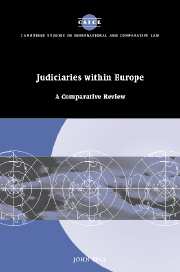Book contents
- Frontmatter
- Contents
- Preface
- List of abbreviations
- 1 Introduction
- 2 The French judiciary
- 3 The German judiciary
- 4 The Spanish judiciary
- 5 The Swedish judiciary
- 6 The English judiciary in comparative perspective
- 7 Factors shaping the character of the judiciary
- Index
- CAMBRIDGE STUDIES IN INTERNATIONAL AND COMPARATIVE LAW
7 - Factors shaping the character of the judiciary
Published online by Cambridge University Press: 21 July 2009
- Frontmatter
- Contents
- Preface
- List of abbreviations
- 1 Introduction
- 2 The French judiciary
- 3 The German judiciary
- 4 The Spanish judiciary
- 5 The Swedish judiciary
- 6 The English judiciary in comparative perspective
- 7 Factors shaping the character of the judiciary
- Index
- CAMBRIDGE STUDIES IN INTERNATIONAL AND COMPARATIVE LAW
Summary
This book has focused on the importance of institutional features in shaping the character of a judiciary and its corporate role. Goodin argues that there is a ‘stable, recurring, repetitive, patterned nature of the behaviour that occurs within institutions and because of them’. Such institutional features provide the framework not only for stability, but also for continuity and change. This analysis suggests that institutions have an important role in shaping the development of individuals within their role. It does not imply that individuals are shaped only by their institutions. The multiplicity of the influences on a particular individual makes this inconceivable. Rather, an institutional analysis identifies a regularity of influences that offer both opportunities and constraints to the collection of individual actions. Particular individuals may have their own path within the judiciary and outside it, but the institution itself does offer initial formation and possibilities for activity.
Institutions are formally designed in that there are organisational structures; but they also have informal features. Once established, the institution will operate not simply within the tramlines established by its organisational structure, but will be part of a wider social activity to which it relates. The judiciary is not just a body deciding cases within the formal hierarchy of courts, but it is also a constitutional institution negotiating its place within the separation of powers, a social institution that contributes to the solution of issues such as crime and family breakdown, and a set of legal professionals who have to establish their place both within the legal community and among professionals in general.
- Type
- Chapter
- Information
- Judiciaries within EuropeA Comparative Review, pp. 350 - 383Publisher: Cambridge University PressPrint publication year: 2006

